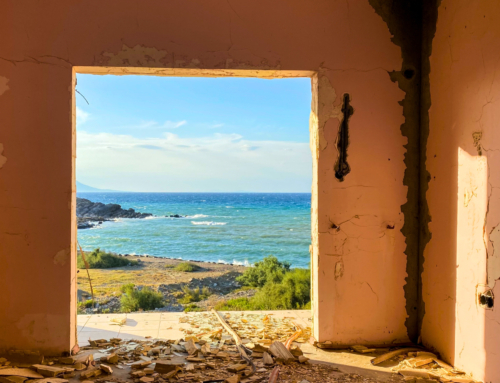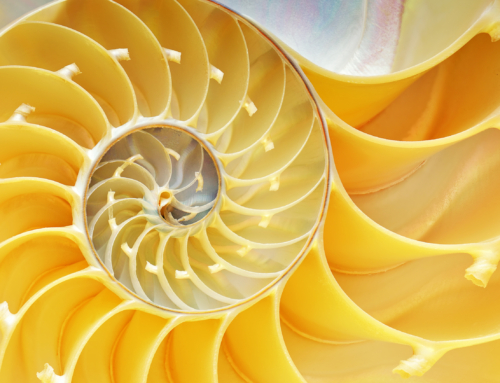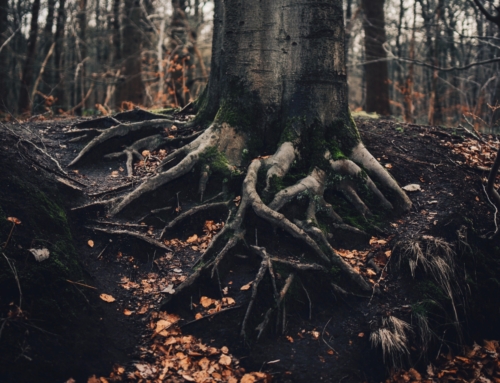[To listen to an audio version of this post, click here or search for “Again, but with Feeling” wherever you get your podcasts.]
I was never the kid that dreamed of having babies. I didn’t make my dolls get married and live out the fantasy life of the nuclear family. I never dragged a stroller around with a plastic infant inside. My brothers and I were usually too busy lighting these toys on fire over the BBQ.
In all seriousness, though, I’ve never had the lifelong GOAL of having a child. It wasn’t a clear destination like it is for some people. A loving partnership? Yes. I pined for that. Freedom? Yes. I climbed mountains and crushed hearts for it. Knowledge? Absolutely. I immerse myself in everything and anything I can read and debate.
Babies? Hmmm.
This is the terrain where personal life collides with cultural expectations. While I never behaved in a way that said, “I want to be a mom someday and I’ll do whatever it takes to get there,” I always – and I mean always – assumed that I would be a mother one day. And a damn good one at that. Most girls of my generation assumed we would become mothers.
So it’s a very disorienting experience: to become an adult and make very few moves towards motherhood yet simultaneously imagine myself becoming a parent. It feels like living two realities at once and then having to constantly, coincidentally grieve the one track that remains unrealized. It’s painful, and on top of that, it’s a suffering that doesn’t cease until you realize that you’re trapped in a lose-lose dynamic.
Even more disorienting for me, especially as I began to approach my mid 30s, was the feeling of being dispassionate about any choice at all. On top of trying to tease apart social conditioning, cultural expectations, and biological instinct from my own personal convictions was the sense that maybe I had no strong personal convictions on the matter at all. Or, if I did, I really couldn’t tap into what that was.
This brings up the very real psychological experience of ambivalence – holding two or more opposing views or desires at once, which is not to be confused with apathy or indifference. What I’ve learned about the ambivalent state through my own experience is that when it arises the decision or outcome is sort of irrelevant to the moment.
We all have experiences where we fixate on a decision that we cannot seem to make because we feel we can make a decent case for each of the outcomes. I usually come up against this feeling when I’m deciding if I should go on some big vacation with friends. I start to craft stories in my head about why I should go, why it will be great. And then I craft equally compelling stories as to why I shouldn’t go, which usually has something to do with saving money.
What I’ve learned is that, in these situations, it really doesn’t matter if I go or not in the grand scheme of things. In my agonizing analysis of the choice, I’m attempting to make meaning or apply some significance where there is none to be made. Maybe I’ll meet my future husband on the plane. Maybe I’ll avoid a major earthquake at home. All this scenarioizing betrays the lack of inner conviction.
When ambivalence arises, the decision is not the point, and the outcome is rarely spiritually consequential to the trajectory of a life.
Now I can hear your objections already. You’re thinking, but wait Erika, having a kid is a HUGELY consequential decision. And yes, you’re right that having a child is objectively consequential – just as not having one is equally consequential.
But when I’m sitting in my own ambivalence about being a mother, there is this nagging feeling that for MY life, it has not really mattered. What matters is my coming to consciousness about this inner tension, and my tending to it so that I can perhaps, with my one little life, help shift the ancestral and cultural inheritance of this issue for the many women (and prospective parents in general) who come after me.
Because if I don’t look at it that way, all I end up doing is writing lists on paper that defend or refute the decision for or against. I debate myself using my thinking mind which is not good at these kinds of tasks. I try to buy into the narrative that not having a kid is a better choice for the planet, or that having kids is a vitally meaningful component to the human experience. Or that not having children affords freedoms that parents don’t have, or that having kids brings an expanded sense of love that non-parents can’t access.
Very little of this debate is valid for the individual. None of it really means anything to MY story, to my doubting or grieving or wondering what if. I know people who are crystal clear that they don’t want kids – and they have lots of reasons to cite and an almost allergic reaction to the idea. And I know others without a shred of a doubt that they do – also with all their reasons and certainties. This is not me. And the reasons are irrelevant. These people have an inner knowing. One that I did not come pre-packaged with on this particular subject. At least not yet.
What I do know is that this is the first time in history that having children is becoming a real, conscious choice for women and no longer a passive assumption or obligation. It’s a lifestyle choice, which is a reorganization of all the social values and mores we have erected.
This raises a cascading waterfall of other considerations. And this is where the universal and the personal levels of consciousness and context collide once again. I am the product of my time. I am deeply influenced by the feminist movements of modern history as well as the way that larger narrative weaves itself into my own lived experience. My mother and father divorced when I was nine years old, and my mom proceeded to raise three of us by herself on a teacher’s salary. I took one look at our lives, and one look at my dad’s behavior, and said to myself, no, no thank you. I definitely don’t want THIS. I felt the financial strain and the ever-present stress, and decided I did not want to relive that experience again but on the other side of it, as the parent. So, the choice to parent became predicated or contingent upon several outside factors. I often would say that if I met the right person, fell in love, and we had enough money, I would probably have kids.
But let me tell you why all of this weighing and calculating and obsessing and ruminating over this perceived “decision” was somewhat irrelevant…
I didn’t meet that partner (not yet at least) and I haven’t lived that life where the inevitable outcome is a child of my own.
Let me say that again. I haven’t lived that life.
In this light, the decision is irrelevant to the outcome, and the ambivalence is a deeply real experience. In some ways I can interpret the ambivalence as being sort of open to (or, in other terms, resigned to) whatever outcome presents itself most compellingly.
[As an aside: this is an uncomfortable paradox that makes us wonder how much egoic “will” should be applied to a life, and in service to what outcome? How much are we supposed to muscle toward something as opposed to allow or follow life’s unfolding? While this is a tangent, I would offer that, ideally, we learn to bring the will in service to the deeper, intuitive Self.]
For many of us with maternal ambivalence, we feel like freaks of nature. Most people look on with suspicion usually assuming we’re just covering for a real shortfall in life and that we must be deeply in pain.
What they miss is that the pain of never having an experience can coexist with the pleasure of never having that same experience.
That is ambivalence at its core.
To expand this idea a little bit, I think we live in a time when we truly believe that every decision is extraordinarily important to the outcomes of our lives and to the eventual happiness we think we might reach if we just make the right choices.
This belief weighs so heavily on every step we might take that it becomes bone crushing. It’s paralyzing. And so not only do we get overwhelmed by bigger life decisions like moving to a new city, we also become utterly incapacitated when confronted with the ever-present conundrum of what we should eat for dinner. Whether it’s tacos or pasta, it absolutely just doesn’t matter.
Analysis paralysis is a product of our myopia. We are too narrowly focused and thus we assume that each move we make has some existential meaning. We are tied to the idea that we have a dramatic hand in our own fates and destinies. That’s not to say that my life wouldn’t look very different if I had my heart dead-set on becoming a biological mother. If that were the case (and if my upbringing and traumas were all the same), I would have married someone inappropriate, had children, and relived my mother’s story. But I would have had children.
From where I sit, it feels very clear that when there is a decision to be made, we make it. When we have an inner compulsion that feels strongly for or against something, we will know it. And when a fork in the road emerges that is absolutely critical to the fulfillment of a meaningful life – meaningful to us based on our personal values and desires and beliefs and not meaningful to the culture – we will take it seriously and have the capacity to know deep down that there is a “right” and a “not so right” for us at this juncture.
Regardless of how much you think you are responsible in every single moment for shaping the entirety of your existence, I’m sorry to break it to you, but the rest of it just isn’t in our hands, and the most meaningful choices we make will be ones that aren’t mired in ambivalence.
Now for those who want a little bit of the psychology of ambivalence, continue on…
First, I want to address the distinction between true ambivalence and what often happens to us upon coming to a clear but perhaps challenging choice. Sometimes we get crystal clarity – usually through intuition or some visualization or feeling – that there is a decision to be made and a path we must take. The more time that passes without action after that clear vision or deep knowing, the easier it becomes for us to doubt, obfuscate, or question that original stroke of insight that felt so right. If this is a pattern for you, like it is for me, then you’ll find that you have absolutely zero access to that original feeling because of all the ways your body and psyche have shut down the window of opportunity for change. While there is so much more that could be said here, to stay on topic I’ll just emphasize that if you once had a very clear sense of direction around a decision (whether it was four months ago or forty years ago), but you can no longer feel it, you’re probably not dealing with ambivalence but some other force, complex, or neurosis within you that wants to avoid having to follow through on that piece of inner wisdom. In my experience, this is the closest I can get to a definition of true psychological suffering: becoming aware of a path of action that provides intense meaning for our lives and being unwilling to follow it for whatever reason.
What’s really interesting to me is that in Carl Jung’s analytical psychology, he suggests that the nature of the psyche itself is ambivalent toward incarnation or birth. What this means is that the layer of consciousness that is universal, collective, or part of a greater stream of psyche – what is known as the Self – might be ambivalent about whether or not it becomes differentiated or manifest through you personally, through your individual ego.
There’s an inherent ambivalence about personal development and our capacity to grow or individuate. That means that what we think of as “higher consciousness” or “god-consciousness” isn’t inherently “good” or inherently “wise.” It just is, and it holds its own tension. This psychological ambivalence mirrors our confrontations with the tension of ambivalence in everyday life. We expect to see and experience very clear preferences, and we expect a duality in the choices that are presented to us where one is obviously good and the other is obviously bad. The dichotomy of morality fixates us but it’s not the natural state of the psyche. And so ambivalence is actually a natural state of consciousness. Jung essentially says as much in Psychology and Alchemy when he asserts that a person who is always in a state free of friction, contradiction, or tension is pathologically one-sided and therefore “incomprehensible.”
From Jung’s perspective, then, perhaps maternal ambivalence is the more normal state of being. It just happens that our culture and biological imperatives collectively have favored and thus incarnated the side that procreates…until now. As the culture shifts, we are becoming more conscious of the choice, and then also the tension. We are capable of giving more credence to the other truth, that we may also not want to become (or be) parents. On that note, I invite you to think about experiences of ambivalence in your own life and what your relationship is to living within the tension that practically and psychologically defines our lives. Can you be with it? Can you sit in the company of multiple conflicting yearnings without succumbing to the impulse of finding a “good” option? Can you free yourself from decision-making and instead listen to the deeper energetic discourse of your life?
I’d love to hear about your stories of ambivalence. You can share them on my Instagram or message me through my website.





![The Weight of Assumed Potential [New Year Newsletter]](https://www.erikaleighraney.com/wp-content/uploads/2022/01/simon-berger-hxMdsEaiSyE-unsplash-500x383.jpg)